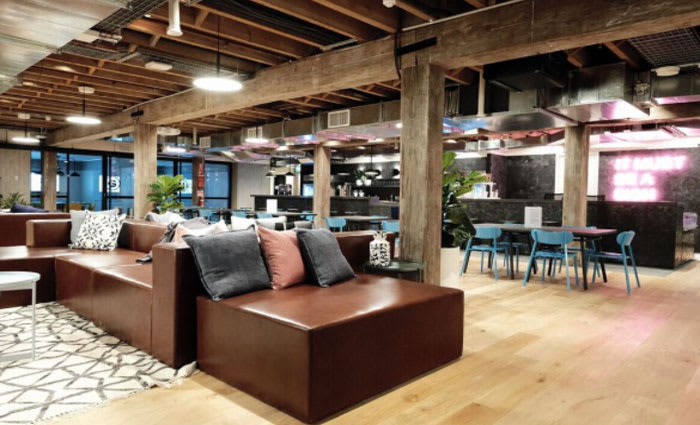Perhaps not pets in the office, but workspaces need to outdo the local coffee shop
Workspaces of the future must be designed to be better than any alternative, according to Tim Lovitt, Associate Director of Digital Intelligence, PwC Australia.
He recently suggested said the firm could take up co-working space in future in the new building at Barangaroo.
“PwC has been experimenting for over a year with co-working space," he said.
"We have diverse partnerships, including Facebook and LinkedIn, tailored to solving specific problems for individual projects.
"This is our focus, and we will build our workspace around that.”
Lovitt said workspaces of the future must be designed to be better than any alternative.
“Workspaces of the future will need to be incredible spaces that people wish to work in, that are better than the alternatives – such as our lounge rooms or the local coffee shop,” concluded Mr Lovitt.
He made the comments at Knight Frank Australia's Global Cities: The 2017 Report launch which investigated the future of real estate in the world’s leading cities.
According to Knight Frank’s Head of Research and Consulting, Australia Matt Whitby, disruption is set to equal demand in the real estate sector.
“Yes, jobs are being lost across sectors globally due to automation and technology, but humans are getting more interesting careers doing what humans do best – problem solving. This will be similar for property professionals, who need to embrace changes in the sector and the economy and become more advisory – offering greater intelligence and idea generation to clients," he said.
“New jobs being created are offering a flow-on effect into other sectors, including property. For example, the Fintech sector, including cashless payments and other financial technology, has created a complete new industry. This is prompting new demand in other sectors, including real estate. Newly-created, high-value jobs in programming or app design are creating demand for expensive, trendy offices.”
Whitby agreed co-working will be one of the biggest growth sectors in the global city office markets, with Sydney and Melbourne leading the way here in Australia.
“It will not just be start up, incubator, or collaborative businesses. Demand for co-working space will expand to the large, corporate occupiers who require growth or project space on an as-needed basis.”
Whitby said WeWork is the obvious example as in Sydney, WeWork has gone from zero space six months ago and will occupy 22,000 square metres of space by next year.”
In October WeWork Martin Place opened in the heart of Sydney’s central business district surrounded by Australia's financial institutions in an historic Sydney building, the Moneybox Building.
Designed by WeWork, along with local external consultant TomMarkHenry, the design takes cues from the building’s banking history as the hot desks on the main floor were inspired by the old bank teller desks that can still be seen in the lobby. Murals and paintings from local artists Tristan Kerr and Dina Broadhurst adorn the inside of the building.
Last month WeWork, the space, community and services provider based in New York, opened its second Sydney location, at 100 Harris Street, Pyrmont (above).
WeWork currently has around 70,000 members, located in 100+ physical locations in 30+ cities and 12 countries around the world.
WeWork Pyrmont is located in a former 100 year old woolstore and presents a unique opportunity for one of WeWork's spaces.
The issue of pets in the office was addressed by Savills International.
"Popularity for bringing pets to the workplace seems to be increasing around the world," it noted.
"In the United States, a 2015 Society for Human Resource Management survey found that 8 percent of American workplaces allowed employees to bring pets to work (up from 5 percent in 2013).
"Within Australia, the uptake for large corporations has not been very high, although the types of companies that have embraced this new fur-friendly culture tend to be creative or industries such as fashion, tech, IT, media and start-ups," the Savills report noted.
It noted the location of the workplace can also greatly affect the likelihood of the company to include pets in the office.
"We are seeing companies on the city fringe and suburban locations more open to the idea of pets in the office, as there is plenty of space in the surrounding areas for the animals to have a break outside of the office."
Savills wondered did the trend deliver real benefit to your company, or is it just a distraction?
What are the benefits?
For the employees: Employees who bring their pets to the office often have less stress and a healthier work-life balance
For the workplace: It can be a great improvement to the workplace culture - pets are a great conversation starter and can help strengthen working relationships
For the business: Having pets in the office can encourage employees to stay longer hours and businesses have shown a lower rate of employee absenteeism. Plus, pets in the office can be a drawcard for attracting new employees
For the animals: The animals get benefits too, including being out and about (instead of cooped up at home) and socialising with new people
Things to consider
When considering drawbacks to having animals in the workplace, the number one concern is usually allergies. Depending on the type of allergy, one way to lessen the trigger of an allergy is to ensure the pets are clean & groomed. Alternatively, employees should set up pet-free zones, or keep their pet close to their own workstations
It’s also important to select the right types of pets to bring into the office – overly animated or energetic animals can serve as a distraction in the workplace
